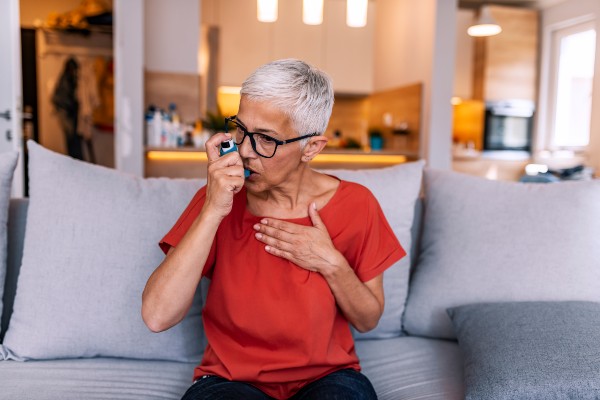Because COVID-19 is a respiratory illness, having asthma puts you at higher risk for complications if you contract the virus.
According to the Centers for Disease Control and Prevention, you’re at high risk for severe COVID-19 complications, including pneumonia and acute respiratory distress syndrome, if you:
- Are over age 65
- Live in a nursing home or long-term care facility
- Have moderate or severe asthma or other chronic lung condition
- Have a serious heart condition
- Are immunocompromised
- Are undergoing cancer treatment
“Patients with asthma should take extra precautions to avoid exposure to the COVID-19 virus,” says Vikas Pathak, M.D., pulmonary medicine physician with Riverside Health.
Avoiding exposure
Because there is currently no clear treatment for COVID-19, your best approach to staying well is to take steps to avoid exposure to the virus.
- Avoid large crowds or other public gatherings
- Stay at home as much as possible
- If you must interact with others, practice social distancing, keeping at least 6 feet between individuals
- Wash your hands with soap and water frequently, for at least 20 seconds
- Avoid touching your face
- Disinfect commonly touched surfaces throughout your home (for example, light switches, door knobs, and countertops)
Be prepared
Stock up on any medications you may need in order to stay at home until the virus spread has been contained. This includes at least a 30-day supply of quick-relief asthma inhalers and any long-term asthma control medications you’re currently taking.
Also stock up on over-the-counter medications you may need if you become sick. These may include (ibuprofen or acetaminophen, cold medicines, decongestants) or others.
Fill your pantry with nonperishable foods, including beans, rice, canned goods and other long-lasting staples. Similarly, supply your house with day-to-day necessities, including toilet paper, toothpaste, shampoo, soap and laundry detergent.
If possible, to avoid exposure to crowds, do your grocery shopping at times when stores are less crowded, (such as early in the mornings), or take advantage of grocery pick-up or delivery services.
Follow your asthma action plan
Continue following the asthma control plan that you and your doctor have developed. Take your medications as prescribed. Avoid your individual asthma triggers.
If you find yourself feeling stressed or anxious by around-the-clock news reports of the COVID-19 spread, find ways to unplug for a while. Read or listen to an audio book, do a craft, take a bath, or listen to relaxing music. Be mindful of your mental health, as stress itself can be an asthma trigger.
The American Academy of Allergy, Asthma & Immunology advises that patients, above all, take their regular, daily steps to keep their asthma under control — since seeking Emergency Room help for a severe asthma attack right now could put you at increased risk of being exposed to the COVID-19 virus.
Talk to your doctor if you feel you’re experiencing COVID-19 symptoms
First, be aware of the key symptoms of COVID-19:
- Fever
- Cough
- Shortness of breath
- Fatigue
Some patients have also reported having digestive issues, including nausea and diarrhea. Others have reported losing their sense of smell or taste.
If you experience any of these symptoms, call your primary care physician or allergy and asthma specialist to seek guidance on next steps to take.
Your doctor will likely advise you to stay at home if symptoms are manageable.
If you feel you may have COVID-19, isolate yourself away from others in your home as much as possible. Designate a specific “sick room” and confine yourself there until your symptoms are gone and you’re no longer running a fever.
If your symptoms worsen or you experience life-threatening complications — including difficulty breathing or bluish lips or face — seek emergency treatment immediately.
“We’re all feeling the impact of the worldwide COVID-19 spread, and it’s essential that everyone take the situation to heart and enact steps to avoid exposing themselves to the virus — or spreading it to others,” says Dr. Pathak. “But we also should remember that the vast majority of patients who become sick with COVID-19 will be able to recover fully.”



